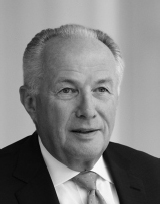deutsch » | english »
Pandemic: science holds the key
Dr. Franz B. Humer, Chairman of the Foundation Board

Even now, more than two years after we first heard the shocking reports from China, the COVID-19 pandemic still has us firmly in its grasp. Although we have grown accustomed to many things, this only makes us long for our "old" lives all the more. Open borders, personal contact, events of all kinds, but also simply meeting up with friends and family – all of this we miss a little more each day.
Amongst all the restrictions and obstacles, however, the pandemic is also sharpening our focus on what is really important. And this undoubtedly – and especially – includes science and research, which are our genuine beacons of hope in these times. Just imagine where the world would be today if the research industry had not succeeded in developing effective vaccines at breakneck speed. And the fact that there are now various highly promising drugs on the horizon to fight COVID-19 underlines the key role played by research and development in times of crisis.
However, it is not just the medical sector that was and is put under pressure in a pandemic. Critical questions are also posed of our economies. Likewise, the actions of national governments, cross-border cooperation and many more factors need to be tackled from a scientific perspective. In short, the consequences of and lessons to be learnt from the pandemic will keep various fields of science occupied for a long while yet. What will be decisive in my view will be the courses of action that researchers can devise to exert a positive influence on how governments, but also individuals, behave during major crises in the future.
In other words, I think, science is more in demand nowadays than perhaps it has ever been – at a time when the public sector is stretched to the limit because of the direct and indirect costs of the pandemic. Yet, now more than ever, it would be fatal to meddle with the finances of the educational institutions, particularly those of the universities.
Doing so would jeopardise key areas of academic work, not least that of doctoral training, which has become much more professional over the past 20 years and thus requires significantly more funding than it used to.
This has led us to be particularly highly motivated in pursuing our purpose as a foundation over the last two years, especially since our funding has allowed the doctoral candidates whom we support at the universities in Basel and Salzburg to continue their challenging work despite tougher conditions. Needless to say, some doc-torates that were originally intended to take three years will require a few more months to finish off, not least because of the border closures. But at least we are able to provide some financial support in these cases too.
Our Foundation has been working to benefit talented young scholars for 15 years now. Over this time, we have been able to help many highly impressive theses see the light of day and will be maintaining this support until the end of 2024. The valuable experience we have gained working with these exceptional members of the academic and scientific community has made a lasting impression on us, for which we are most grateful.
